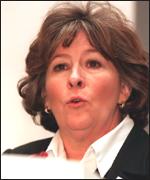 |
|
Louise Arbour
|
The Perspective: Madam Louise Arbour, How do you explain that the UN Tribunal for Rwanda has the mandate to investigate the 1994 attack by missile on the plane carrying two Central Africa Presidents Cyprien Ntaryamira (Burundi) and Juvenal Habyarimana (Rwanda) who both died in the attack, but the Tribunal has not investigated this attack as a first step towards judging those believed to have been responsible for the genocide which was triggered by the shooting down of the plane?
Arbour: The Question of the role of the plane crash in the triggering of the genocide is a very complex matter, it situates itself in the mandate of the Tribunal but it is not necessarily clear that this event [the plane attack] in itself constitutes a crime within the jurisdiction of the Tribunal. It is not apparent that the shooting down of the plane which led to the killing of the Presidents of Burundi and Rwanda would in itself constitute a war crime, a crime against humanity or an act of genocide.
The Perspective: But the UN itself is on record as recognising that the missile attack on the plane that killed the two Presidents triggered off the genocide.
Arbour: Well, the question is not about what the UN has recognised , there is no question that there is a link between these events but where it situates itself exactly in the mandate of the Tribunal and what investigative work was possible and achieved is not something I can comment on.
The Perspective: But there are concerns that the lack of investigations into the missile attack on the Presidential plane that killed Presidents Habyarimana and Ntaryamira puts the Rwandan Tribunal’s credibility into question because that is where they need to have begun to investigate those responsible for the genocide what's your comment?
Arbour: Well, the credibility of the Tribunal I think will have to be judged when it completes its work. It has to do certain things in certain orders and God knows it has already suffered from enormous amounts of difficulties in terms of operations, in terms of witnesses protection and so on. I think history will be the judge of whether this Tribunal's work was reflective of the full magnitude of what happened in Rwanda in 1994. That is what the Tribunal has been asked to do and I think historians, journalists, jurists, maybe a decade from now, will be in a position to pass judgement but it is very difficult to pass judgement on a piecemeal basis as the work is unfolding.
The perspective: The Tribunal's Chief Prosecutor Carla del Ponte had hinted that she would bring the Tutsi perpetrators of genocide and crimes against humanity to trial before the end of this year but the year is coming to an end and still nothing… How do you explain that this has generated concerns that the Tribunal is not impartial and that it still continues to Judge only the Hutus and not the Tutsis?
Arbour: Well, I cannot comment - obviously I have been away for three years and I do not know at what rate any particularly investigations are proceeding but I think the mandate of the Tribunal does not contain any exception or amnesty for anybody whichever side of the conflict might have been implicated. If there were acts of genocide, crimes against humanity or war crimes perpetrated by anybody on the territory of Rwanda during the year 1994 of an order of magnitude sufficient to deserve international attention I think it has to be pursued.
The Perspective: But do you see the Tutsis being pursued by the Tribunal?
Arbour: As I said it's not a question of seeing the world exclusively in ethnic terms, it's not just a question of Tutsis or Hutus but a question of political formations, alliances but at the end of the day the Tribunal is to focus on the personal, criminal liability of anyone implicated of a crime sufficient to attract the attention of the international community and I believe that that excludes nobody.
The Perspective: Thank You very much